Childhood Ear Infection: Alternative to Antibiotics and Ear Tubes
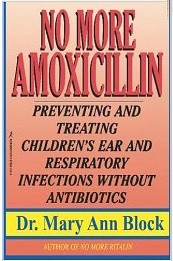 Professor Graham Bell, from McGill University
in Canada, warns that the new antibiotics
pose "a serious and unprecedented" risk to public health. He
warns that regulatory authorities tend not to look many years ahead
when deciding whether to grant licenses to new drugs.
Professor Graham Bell, from McGill University
in Canada, warns that the new antibiotics
pose "a serious and unprecedented" risk to public health. He
warns that regulatory authorities tend not to look many years ahead
when deciding whether to grant licenses to new drugs.
"They are poorly designed to detect even grave and highly probable risks to
public health arising from the population biology of microbes.
Instead of dismissing the possibility that widespread resistance
will evolve, we should use the bitter experience that we have
gained from conventional antibiotics to plan for it."
"Diarrhea, abdominal pain, severe inflammation of the colon
(colitis), irritable bowel syndrome, skin problems, fever, elevated
white blood cell count, weak immune system, vomiting, dehydration,
potassium deficiencies, allergies, colon perforation, bad breath,
excess stomach gas, yeast problems, nutritional deficiencies and
constipation are just some of the many side effects and problems
linked to antibiotics.
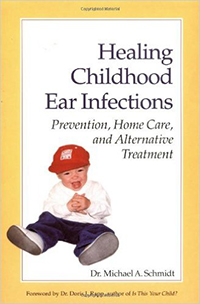 David A. Holland, M.D.on childhood ear
infections: "In one study, children administered
antibiotics for acute otitis media suffered double the rate of
adverse effects compared to children in the study who took placebos
(Clinical Evidence. 2000). The difference in outcome
for those children in the study who took antibiotics
compared to those who do not was almost negligible."
David A. Holland, M.D.on childhood ear
infections: "In one study, children administered
antibiotics for acute otitis media suffered double the rate of
adverse effects compared to children in the study who took placebos
(Clinical Evidence. 2000). The difference in outcome
for those children in the study who took antibiotics
compared to those who do not was almost negligible."
Doctors Overuse Antibiotics in Children
One of the hardest things for a parent is to watch their child
in pain and not be able to help. If your child has a pattern of
repeated ear infections, you probably feel helpless. The
conventional medical approach is to give antibiotics every time an
ear infection is diagnosed. Or if these are ineffective, a
tympanostomy (tubes) is performed . Most conventional doctors will
convince you that there is no other option. Instead
of giving antibiotics every time your child has an ear infection, homeopathy, and
raising the glutathione level can strengthen your child's health so that
the whole pattern of getting sick stops.

Most Ear Infections Clear Up Without Antibiotics
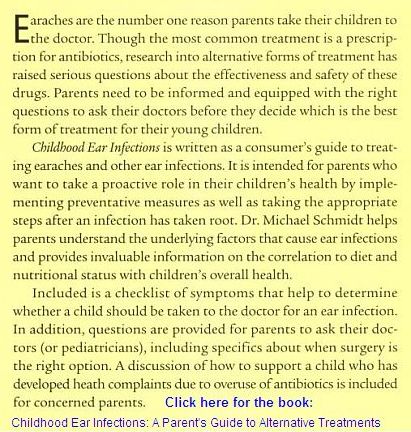 A newly released report from the Agency for Healthcare Research
and Quality (AHRQ) suggests that children may not always need
antibiotics to treat a middle ear infection (otitis media).
Researchers from the Southern California/RAND Evidence-based
Practice Center(EPC) found some interesting findings, including: Nearly
two-thirds of children with uncomplicated ear infections recover
from pain and fever within 24 hours of diagnosis without antibiotic
treatment - Over 80% recover within 1 to 7 days.
A newly released report from the Agency for Healthcare Research
and Quality (AHRQ) suggests that children may not always need
antibiotics to treat a middle ear infection (otitis media).
Researchers from the Southern California/RAND Evidence-based
Practice Center(EPC) found some interesting findings, including: Nearly
two-thirds of children with uncomplicated ear infections recover
from pain and fever within 24 hours of diagnosis without antibiotic
treatment - Over 80% recover within 1 to 7 days.
When penicillin and other wonder drugs revolutionized Western
medicine in the 1940s and '50s, it seemed as though every
infectious illness could be cured with a few pills or injections.
But half a century after it began, the golden age of antibiotics is
ending with the alarming news that the drugs that were supposed to
save the world have instead spawned an epidemic that may destroy
it. Antibiotics and ear tubes treat symptoms of a problem.
They do not strengthen the organism so that it can fight the
infection itself, nor do they make the organism less resistant to
future infection.
While Dr. Carlson concedes that antibiotics can save
lives, he warns that both physicians and patients must be judicious
in their use of antibiotics. If they are overused, they are more
likely to become ineffective in treating bacteria. “Antibiotics are
not always the answer,” he says. “Sometimes it just makes sense to
let an ailment run its natural course.”
Dr. James Howenstine, MD - "Multitudes of infants have
frequent recurring ear infections. These “infections” usually
subside when milk intake ceases as they are often caused by allergy to milk. Many children have tubes placed in their ear
canals because of these “ear infections”. This procedure has
recently been discovered to lead to decreased hearing as adults.
This whole infantile ear infection problem is usually milk allergy not bacterial infection."
The Role of Glutathione GSH Level in Illness
Specialists in ear, nose and throat (ENT) and in dentistry have
only recently become aware of the role of (GSH) in the diseases they
treat. The respiratory tract is lined with a fluid made up of a
complicated mixture of biochemicals and cells of the immune system,
called the respiratory tract lining fluid (RTLF). Glutathione is
the main antioxidant in this fluid and provides our initial defense
against inhaled toxins. Institutions like the Inhalation and
Toxicology Research Institute in Albuquerque, New Mexico started
researching the role of antioxidant enzyme activities in RTLF in
the early 1990's. More recent work at the University of California
(Davis) elaborates further on the role of antioxidants in this fluid.
This research project is only one of several focusing on the
importance of glutathione in respiratory tract lining fluids, where
it protects us from xenobiotics and infection. In severe or
prolonged illness, these GSH levels may become depleted and enable
the disease to progress and cause further complications.
Furthermore, N.S. Krishna and his team at the University of
Kentucky showed that this glutathione defense system weakens with
aging, and more quickly in men than women.
Taking Out Adenoids Does NOT Help Ear Infections
-Conclusions from a study showed that removal of the
adenoids, often associated with swollen tonsils, as the first
surgical treatment with children the ages of 10 to 24 months with
recurrent middle ear infections, was not effective in preventing
further episodes. British Medical
Journal February 28, 2004; 328:487 (Free Full-Text
Article)

Post-Traumatic Ear Infection Syndrome
Kelly Dorfman, M.S.
Eleven years ago a group of parents and professional discussed
concerns about the emergence of a regressive autistic like
syndrome, later named Pervasive Developmental Disorder (PDD). All
knew children whose development regressed following frequent otitis
media (inner ear infections.) Could ear infections be causing PDD?
Developmental Delay Resources (DDR) was founded, in part, to answer
this question and to determine efficacious treatments. The autism epidemic now claims an
estimate one in 160 children. Experts currently suspect vaccinations and the mercury-based preservative
thimerosal as major culprits. Ear infections, although not
causative, remain shadowy contributors. Both are part of the “total
load” in susceptible children. A subgroup of children with
attention problems or autistic spectrum characteristics, have a
condition I have named Post-Traumatic Ear Infection Syndrome
(PTEIS). These kids, apparently normal at birth, develop subsequent
auditory processing issues, distractibility and developmental
delays as a result of complications from sustained damage to the
inner ear from both otitis media and its treatment.
Why Ear Infections Are Such a Problem
Frequent ear infections are a sign of weak immune function
Most children on the autistic spectrum have
underlying immune problems. Either
they are born with weak immunity, and are thus more reactive to
foods or they react to foods, thus weakening their immune systems.
Resultant ear infections are the symptom of a deeper underlying
problem. A classic study one by Tala Nsouli, an allergist in
the Washington, D.C. area that about 90% of children with ear
infections or fluid have food
allergies. When the offenders are eliminated, ear infections
subside. Kids with food allergies get sick more often because their
immune systems focus on reacting to foods, rather than on fighting germs.
The antibiotics used to treat ear infections may make children more susceptible to mercury damage
Preliminary studies by Dr. Boyd Haley, a world authority on mercury
at the University of Kentucky, found that ampicillin and
tetracycline increase thimerosal-induced
neuronal death. In other words, less mercury does more damage in
the presence of these antibiotics. Furthermore, all antibiotics
kill good gut bacteria, essential to resist mercury uptake.
Perpetuating an Illness Cycle
Allergies, ear infections, thimerosal and antibiotics are a toxic cocktail for the
nervous system. A child eats an allergic food and develops an ear
infection. The doctor prescribes an antibiotic, killing both good
and bad bacteria, leaving the gut lining irritated, and further
stimulating an allergic response. Now the child is more reactive to
foods, and develops additional ear infections, thus perpetuating
an illness cycle. Introduce into this disturbing spiral a
thimerosal-containing vaccine or one that acts on the gut lining,
like measles. Who will be more likely to sustain vaccine damage: the toddler with an
already irritated gut lining and reactive immune system, or a healthy child?
Dr. James Adams recently found that children with autism had ten times more
ear infections during their first three years than typical
kids. Almost 20 % also experienced a severe vaccine reaction.
Another recent study linked Augmentin (a broad based antibiotic) to
the development of autism.
Ear infections are associated with auditory processing problems
Children are born with hearing but they must learn how to listen.
Ear infections that occur during critical developmental periods
negatively affect auditory processing. Youngsters whose ears are
clogged up with fluid cannot interact appropriately with their environments. Between
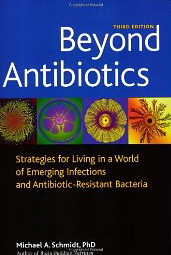 birth and three, children learn to distinguish sounds
and interpret them in context. They must filter out unimportant
sounds such as the air conditions, and focus on important ones,
such as a mother’s voice. Distracted an inattentive behavior is the
result of the inability to sort significant auditory input from the
extraneous. Studies have found that middle and high school students
who are more distracted than their peers experienced early ear infections.
birth and three, children learn to distinguish sounds
and interpret them in context. They must filter out unimportant
sounds such as the air conditions, and focus on important ones,
such as a mother’s voice. Distracted an inattentive behavior is the
result of the inability to sort significant auditory input from the
extraneous. Studies have found that middle and high school students
who are more distracted than their peers experienced early ear infections.
What To Do About Ear Infections
Remove problematic foods. The four problem foods most associated
with ear infections are dairy products, wheat,
soy and eggs. Before trying an extreme elimination diet, consider
taking foods made from cow’s milk out of the diet first. This
change alone is often sufficient to reduce or stop infections.
Use good bacteria. Probiotics, available in the
refrigerator section of health food stores, balance the digestive
tract and reduce allergic tendencies. It may take some trial and
error to find the right product for your individual situation. Some
are too strong and will increase gas and irritability; others are
not potent enough. If symptoms do not alleviate in a few days,
reduce the dose or change brands.
Relationship between Middle Ear Infections and Inattention
The main culprit for attentional deficits is often believed to
be the result of hearing loss (even mild), early in a child's life
due to complications with the middle ear, including infections,
allergy-related causes or build-up of fluids in the canal. As a
result, the child begins to miss out on verbal cues, and does not
develop the same level of response to an adult voice. Auditory
deficiencies (including auditory processing disorders) may stem
from this key development period, even if the hearing difficulties
are only temporary.
Not surprisingly, there is a wealth of data associated with
hearing loss due to middle ear complications can lead to language
processing difficulties. We have seen how auditory processing
disorders can often occur as a comorbid factor in ADHD, and may be
linked to seemingly unrelated behaviors including comorbid anxiety
and conduct-related disorders. It is important to note, however,
that other early childhood studies have not seen a link between
infection and attentional difficulties (observed by parents,
teachers, or clinicians).
Interestingly, environment may play a huge role in explaining
this discrepancy between study results. One study found that
children who had middle ear complications early on along with poor
home environments were significantly more likely to develop
attentional difficulties (along the lines of what would be
classified as ADHD). Therefore, the effects of early ear infections
on compromised attentional difficulties may be significantly
reduced if a supportive home environment is maintained for a child.
This is good news for parents of children with ear infections. But
what about the hyperactive component of ADHD?
For over 30 years, researchers have linked high rates of ear
infections and hyperactivity. Later studies confirmed these findings,
including one which reported the majority of
children medicated for hyperactivity had a past history of 10 or more
childhood ear infections. These numbers were in sharp contrast
to the prevalence of ADHD in non-hyperactive children.
Vaccination Thimerosal Induced Chronic Ear Infections
Peter Baratosy, M.B., B.S., Ph.D. - "I see many children
in my practice. Some are immunized and some are not, my own
children are not. I see the difference between the immunized and
the non-immunized. They're much healthier and have less infections,
colds, otitis media and tonsillitis. Dr. Michael Odent has written
a letter in the JAMA (1994) where his figures show a five times
higher rate of asthma in pertussis immunized children compared to
non-immunized children. He is also quoted in the International
Vaccination Newsletter (Sept. 1994): "Immunized children have more
ear infections and spend more days in hospital."

Breast Feeding has proven to protect against Ear Infections
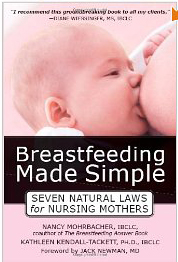 Recent studies show that the longer a baby is nursed, the less
likely he or she will be to contract otitis media and other
infections. Possible reasons for this are that mother's milk
contains antibodies that protect against disease, and that nursing
precludes the use of cow's milk (an irritant to the eustachian tube
and a common allergen). Causative factors involved in earaches, ear
Inflammation and infections is susceptibilitywhich can be triggered by substituting early bottle
feeding for breast feeding.
Recent studies show that the longer a baby is nursed, the less
likely he or she will be to contract otitis media and other
infections. Possible reasons for this are that mother's milk
contains antibodies that protect against disease, and that nursing
precludes the use of cow's milk (an irritant to the eustachian tube
and a common allergen). Causative factors involved in earaches, ear
Inflammation and infections is susceptibilitywhich can be triggered by substituting early bottle
feeding for breast feeding.
Human breast milk seems to have a prophylactic effect on a baby,
although the exact reason why is not understood: that is, whether
it has more to do with an intolerance to the cow's milk or the
natural immune boost provided by mother's milk, or a combination of
both. A related factor to bottle feeding is that supine feeding
with the bottle has been shown to cause regurgitation of the milk
which then has a chance of entering the Eustachian tube. Another
very common etiological factor in children is one or more food or
inhalant allergies.
Dr. Mercola - " The treatment of ear infections in this country
is a HUGE problem. Most of the chronically sick children I see were
given antibiotics frequently for recurrent ear infections. The sad
tragedy is that nearly all of these are preventable by simply
changing the diet.
Avoiding milk and dairy is the single largest issue, but clearly
other food allergens contribute. Even with the best diets though a child may get an infection. This does
not mean that the child needs antibiotics. The simple
solution to is to put a few drops of breast milk in the ear canal
every few hours. This usually works to clear up the infection
within 24-48 hours and is far safer, less expensive and a better
solution than putting the child on antibiotics. If the mother is
not breastfeeding, it is likely she knows someone who is. All that
is required for the treatment is about one half ounce of breast
milk, so obtaining that from a friend will work just as well. If
you know someone who has a child with ear infections PLEASE forward
them this article. You may make a huge impact on the future health of that child."
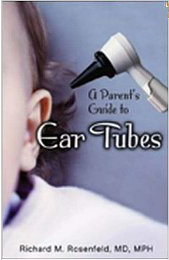 Dr. Moskowitz on vaccines and ear infections - "A
critical factor in the long term treatment of otitis media is the
effect of vaccinations on the immune system. He strongly advises
parents against vaccinating their children until they are
completely over the cycle of ear infections. Many parents don't
realize what an added stress a series of vaccinations, such as the
DPT booster, poses to the child's weakened immune system.
Dr.Moskowitz has seen many children who are nearly cured of a
chonic ear infection have the cycle return following a routine
immunization."
Dr. Moskowitz on vaccines and ear infections - "A
critical factor in the long term treatment of otitis media is the
effect of vaccinations on the immune system. He strongly advises
parents against vaccinating their children until they are
completely over the cycle of ear infections. Many parents don't
realize what an added stress a series of vaccinations, such as the
DPT booster, poses to the child's weakened immune system.
Dr.Moskowitz has seen many children who are nearly cured of a
chonic ear infection have the cycle return following a routine
immunization."
Herbal Medicine
Herbal remedies for ear infections include the
internal use of echinacea, as well as garlic oil capsules, says Dr.
Hoffman. He also recommends drops of Mullein flower oil in the ear,
as long as there is no perforation of the ear drum. Hoffman tells
of a six year old boy who was diagnosed as having neurological
deafness (damage to the auditory nerve in both ears) . Though the
child was not in any pain, he had not been hearing well in class.
He came to Hoffman with his family, all of whom suffered from
severe sinus problems. The herbs prescribed to the family members,goldenrod, echinacea and
raw garlic helped reduce excessive
secretion of mucous. Since there are no herbs that can cure
neurological deafness, Hoffman did not expect the child's hearing
loss to improve. However, in treating the whole family for sinus
blockage, with a low-mucous diet and the prescribed herbs, the
boy's sinus problem cleared up and his hearing did
improve. Hoffman concluded that the child had been misdiagnosed and that 50
% of his hearing problem had been due to mucous buildup resulting
from a prolonged infection in the middle ear and was not related to
nerve damage.

Homeopathy a Good Alternative for Treating Ear Infections
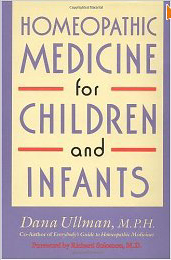 The applications of homeopathy are widespread --
everything from treating the common cold to clearing up childhood
ear infections. It's this latest use that caught the attention of a
group of West Coast researchers, who set out to evaluate in a
scientific way the many reports of homeopathic success. The study,
which appears in the February issue of the Pediatric Infectious Disease Journal,
was funded by the Standard Homeopathic Company and took place in a
private pediatric practice in Seattle. Children with middle ear
infection received either a homeopathic remedy geared to their
specific symptoms, or a placebo. They took the pills three times
daily for five days, or until their ear pain and fever got better,
whichever came first. The children, aged 18 months to 6 years, were
divided into two groups, with 36 receiving homeopathic treatment
and 39 getting placebo. Neither the researchers nor the parents
knew which treatment each child got until the study was over. Eight
different homeopathic remedies were given in combinations that were
individualized for each child, depending on his or her mood, type
of pain, amount of thirst, and length of time with
symptoms.
The applications of homeopathy are widespread --
everything from treating the common cold to clearing up childhood
ear infections. It's this latest use that caught the attention of a
group of West Coast researchers, who set out to evaluate in a
scientific way the many reports of homeopathic success. The study,
which appears in the February issue of the Pediatric Infectious Disease Journal,
was funded by the Standard Homeopathic Company and took place in a
private pediatric practice in Seattle. Children with middle ear
infection received either a homeopathic remedy geared to their
specific symptoms, or a placebo. They took the pills three times
daily for five days, or until their ear pain and fever got better,
whichever came first. The children, aged 18 months to 6 years, were
divided into two groups, with 36 receiving homeopathic treatment
and 39 getting placebo. Neither the researchers nor the parents
knew which treatment each child got until the study was over. Eight
different homeopathic remedies were given in combinations that were
individualized for each child, depending on his or her mood, type
of pain, amount of thirst, and length of time with
symptoms.
Antibiotics and ear tubes treat symptoms of a problem. They do not
strengthen the organism so that it can fight the infection itself,
nor do they make the organism less resistant to future infection. A
study, published in the Pediatric Infectious Disease Journal on
2/12/01, is the first placebo-controlled study to suggest that
homeopathy is effective in the treatment of
acute otitis media in young children. Their randomized, double
blind, placebo-controlled, pilot study of 75 children aged 18
months to six years with middle ear effusion and ear pain and/or
fever for no more than 36 hours was conducted in Seattle Washington
by Jennifer Jacobs, M.D.
Herbal Antibiotics: Natural Alternatives for Treating Drug-Resistant Bacteria
 Testimonial: "When my 9 year old was little she had
earaches from 2 months old to 18 months. Finally tired of all the
antibiotics, I tried garlic and mullein
drops and sweet echinacea. in 2 weeks no more ear trouble. She
doesn't even have scars from all the swelling from the fluid. They
wanted to put tubes in. Glad I waited." - Sharon Cloud
Testimonial: "When my 9 year old was little she had
earaches from 2 months old to 18 months. Finally tired of all the
antibiotics, I tried garlic and mullein
drops and sweet echinacea. in 2 weeks no more ear trouble. She
doesn't even have scars from all the swelling from the fluid. They
wanted to put tubes in. Glad I waited." - Sharon Cloud
Ear infection: avoiding ear tubes
Date: 10/22/2000
From: SAMINA
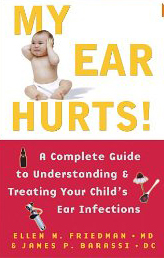 My nephew always seemed to have ear infections. Ever since I can remember he was put
on Antibiotics. It got so bad that my sister- in-law was informed
by my nephew's doctor that they need to put tubes in his ears. God
acts in mysterious ways really, we are in a grocery store and this
woman overheard us talking about the surgery. She told us how an
herb called Echinacea had helped her son. She also tried Garlic/
Mullein leaf oil as well. So, he tried it for 2-3 weeks and what a
relief when we found out that the infection had totally cleared. It is so sad that they don't teach
doctors much about nutrition but instead they pump
kids with all kinds of medications and antibiotics.
My nephew always seemed to have ear infections. Ever since I can remember he was put
on Antibiotics. It got so bad that my sister- in-law was informed
by my nephew's doctor that they need to put tubes in his ears. God
acts in mysterious ways really, we are in a grocery store and this
woman overheard us talking about the surgery. She told us how an
herb called Echinacea had helped her son. She also tried Garlic/
Mullein leaf oil as well. So, he tried it for 2-3 weeks and what a
relief when we found out that the infection had totally cleared. It is so sad that they don't teach
doctors much about nutrition but instead they pump
kids with all kinds of medications and antibiotics.
>
Breast feeding has proven to protect against ear infections.
Recent studies show that the longer a baby is nursed, the less
likely he or she will be to contract otitis media and other
infections. Possible reasons for this are that mother's milk
contains antibodies that protect against disease, and that nursing
precludes the use of cow's milk (an irritant to the eustachian tube
and a common allergen).
While the dangers of formula feeding aren’t something you’re
likely to hear in your doctor’s office, the conclusions can be
derived through an examination of the available scientific research
on infant mortality in the United States and across the world.
There are studies showing artificial feeding’s impact on overall
infant death rates in both developing and undeveloped countries.
While studies offering comparative death rates are not available
for industrialized regions, there are numerous studies providing
comparative occurrence rates for many illnesses and disorders in
the United States and other industrialized nations. Many more
reports are available extolling superior survival rates and
decreased illness rates among breastfed infants, but only those
with solid numbers are useful here. We can assemble the statistics
from these studies to build a firm picture of the ratio of infant
deaths for U.S. formula-fed babies against those who are breastfed.

Comprehensive look at Omega-3 deficiency
Another paper worth reading is the report given by Artemis
Simopoulos, M.D., a pediatrician and endocrinologist from the
International Life Sciences Institute.7 She takes a comprehensive
look at how the Omega-3 deficiency affects many areas, from fetal
growth to arthritis and cancer.
A healthy mother's milk is high in essential fatty acids, GLA,
and other precursors to prostaglandins. Cow's milk is low in
essential fatty acids, and other prostaglandin precursors, and is
high in saturated fats. For this reason, cow's milk is not an
adequate substitute for mother's milk. Neither is baby formula. At
a recent international symposium on Dietary Omega-3 and -6 Fatty
acids Dr. Neuringer, an authority on infant milk, stated that the
low Omega-3, high Omega-6 content in infant formulas is of great
concern because of the imbalance it causes among the resultant
prostaglandins. These imbalances could impair the immune system and
predispose the infant to cancer and heart trouble later in life.
Feeding a non nursing baby a few drops of flaxseed oil will provide
the Omega-3 and Omega-6 essential fatty acids.
There is a growing incidence of allergic diseases in the Western
world and researchers acknowledge the need to offer primary
protection to reverse the trend. The ideal source of infant
nutrition to provide protection from these diseases is breast-milk.
Its role, however, is elusive.
Pediatricians in Finland undertook a double-blind, placebo
controlled study to determine the potential for protection against
allergic diseases by administering probiotics. Mothers who received
probiotics during pregnancy and lactation improved their
anti-inflammatory transforming growth TGF in their milk. In
addition, it was shown that the risk of developing eczema during
the infants first two years was significantly reduced compared with
the placebo group.
Researchers concluded that maternal allergies were a positive
risk for eczema in the infant. In addition infants who appeared to
benefit the most from maternal probiotics supplementation were
those whose cord blood Immunoglobulin E (IgE) concentration was
elevated.